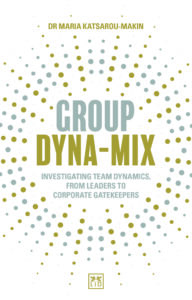|
The Psychology of Team – Need to Belong by Dr Maria Katsarou-Makin
By Guest Contributor Dr Maria Katsarou-Makin, Author of Group Dyna-Mix
Have you ever wondered why your preference to belong (or not) to a group is different to the people you work with? Why do some people have a strong reaction when someone forgets to include them in an email? Why do some people need more recognition than others? And why do some people need more instructions than others? And what happens when people with varying degrees of those preferences get together?
According to Will Schutz, an American psychologist and one of the most respected leaders in the field of human relations, humans need humans. However, they do so to varying degrees. Schutz researched human behaviour in the US Navy with the objective of understanding and improving the performance of a combat information centre. He also did studies on submarine crews and his research centred on understanding interactions between individuals and groups. All of this work resulted in his theory on interpersonal behaviour – “people need people,” i.e. the idea that beyond our physical need for shelter, food, water and warmth, we all have a set of interpersonal needs that motivate a large part of our behaviour. The story behind this quote is that Schutz’s daughter once asked him to help tie her shoelaces. When Schutz told her she was big enough to do it herself, she said, “Yes Daddy, but people need people.” This struck a chord with him. He defined a team as “all the people in an organization, or the people who belong to any unit within it, ostensibly working toward a common goal”.
Our interpersonal needs are broken down into three categories: Inclusion, Control and Affection. Specifically, inclusion addresses how much we generally include other people in our life and how much attention, contact and recognition we want from others. It’s about our relation to groups. Do you like to include others in what you do? Do you give people a lot of attention? Do you want to belong? How much do you want to be ‘in’ or ‘out’? Do you prefer togetherness or solitude? Do you like people to pay attention to you or do you prefer to remain detached? The unconscious concern, or what lies beneath the surface, is the fundamental question ‘Am I significant?’
Control is about how much influence and responsibility you want and how much you want others to lead and influence you. And, perhaps counterintuitively, it’s also about competence. It attempts to answer the following questions: How much power or authority do you want to have? How much do you want to be in charge or take the lead? How much responsibility do you tend to take? How much influence do you want to have over others and how much do you want them to influence you? How do you react to being given orders? In this case, the unconscious concern is ‘Am I competent?’
Finally, affection relates to how warm you are with others and how close you want others to be to you. It provides answers to questions such as the following: Do you behave in ways that show your closeness to others or do you keep your distance? Do you disclose your feelings to other people? Do you want people to show you warmth or do you prefer more impersonal relationships? The unconscious concern, in this case, is ‘Am I loved?’
Since its initial creation and with additional research, Schutz’s framework has served as a very powerful model for understanding how people interact within a group setting. This is because it examines group dynamics and leadership and can provide deep insights into what may be happening beneath the surface. So, Schutz’s theory assumes that people join groups because the group satisfies one or more of their fundamental needs, which are common to all but vary in degree.
Here are some questions for reflection: If you were to assess yourself in those three dimensions, how would you rate yourself? How does that impact your leadership/management style? Compared to the people you work closely with; can you identify anyone that is on the opposite spectrum to you? How does that impact your relationship?
ABOUT THE AUTHOR
 Dr Maria Katsarou-Makin is the founder of the Leadership Psychology Institute and has more than 20 years of experience in organizational development and executive coaching. She combines business and consulting experience and has done extensive work and research in team dynamics.
Dr Maria Katsarou-Makin is the founder of the Leadership Psychology Institute and has more than 20 years of experience in organizational development and executive coaching. She combines business and consulting experience and has done extensive work and research in team dynamics.
Suggested Reading
 Dr Katsarou-Makin explores the team-to-trust and trust-to-team relations between executives and their associates – pertaining to the familial relations between these members and their unconventional codes of conduct. Under this umbrella of governance, directors, leaders and corporate gatekeepers operate in teams that are selected and trusted through unorthodox relations which must now come to light. Dr Katsarou-Makin seeks to explore how these teams operate through a collective consensus of trust and the values this trust demands.
Dr Katsarou-Makin explores the team-to-trust and trust-to-team relations between executives and their associates – pertaining to the familial relations between these members and their unconventional codes of conduct. Under this umbrella of governance, directors, leaders and corporate gatekeepers operate in teams that are selected and trusted through unorthodox relations which must now come to light. Dr Katsarou-Makin seeks to explore how these teams operate through a collective consensus of trust and the values this trust demands.

In Factions of A Mind, Dr Katsarou-Makin examines our role as the carer, learning how to manage the responsibilities as well as the suffering and pain that comes with it, thoughtfully and honestly discussing our duty to care. As carers, our obligation to ‘care’ for the other has inexplicably meant that we do not equip ourselves with the tools and resources to ‘care’ for ourselves after their passing. Our inability to comprehend their loss and the stages of grief we are experiencing leave us vulnerable and open to further pain.
